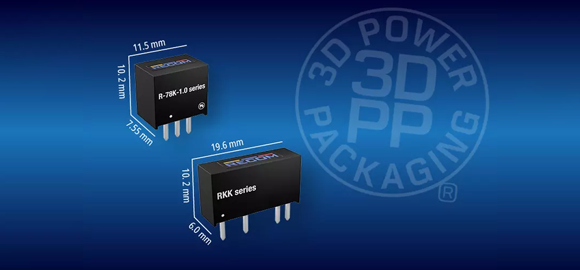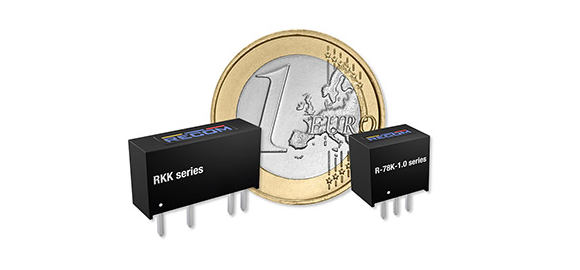Balancing miniaturisation, performance and cost
How low-power DC/DC converters are using cutting-edge technology in following the trend towards miniaturisation
Power Supplies I 29.08.2024
New designs and advanced manufacturing technologies are enabling the automated assembly of DC/DC converters with low power consumption and higher performance without compromising on cost.

Background
Low power PCB-mounted DC/DC converters have not followed the trend towards miniaturisation to the same extent as ICs or surface mount devices, primarily because the magnetic components required in most converters have retained the same manufacturing technology and stayed about the same size for decades. But the miniaturisation of DC/DC converters is significantly influenced by their magnetic cores – due to the material’s intrinsic maximum flux density and the operating frequency, which in turn determines the minimum number of turns. Their size and properties determine the efficiency, heat generation, and ultimately the physical size of the converter.
Modular, low-power PCB-mounted DC/DC converters are produced manually in large quantities in low-cost production facilities. The advantage of this is that a large number of variants can be produced economically in small quantities, even if the manufacture and assembly of the magnetic components is relatively expensive. However, this approach limits the possible complexity of circuits, impedes reproducibility, and restricts electrical performance and miniaturisation possibilities. Materials science and design advances are helping to overcome these limitations.

Figure 1: The R24C2T25 isolated 2W DC/DC converter simplifies the design of WBG gate drive bias supplies (source: Recom)
Modular, low-power PCB-mounted DC/DC converters are produced manually in large quantities in low-cost production facilities. The advantage of this is that a large number of variants can be produced economically in small quantities, even if the manufacture and assembly of the magnetic components is relatively expensive. However, this approach limits the possible complexity of circuits, impedes reproducibility, and restricts electrical performance and miniaturisation possibilities. Materials science and design advances are helping to overcome these limitations.
Solutions
By using state-of-the-art circuit technology and production automation, RECOM is now able to offer machine-made products. These can be configured easily and cost-effectively in production as alternative variants at no extra cost while still offering improved performance – including wider input voltage and temperature ranges and higher insulation values – so that individual components are suitable for a broader range of applications. This reduces the number of variants required, delivering greater cost-effectiveness both in production and for the end user. This has been facilitated through the use of planar transformers – ensuring low assembly costs, reproducibility, and the elimination of casting of selected parts – to save material costs and weight, and by introducing synchronous rectification to improve efficiency, enabling a wider temperature range and energy savings.
Examples
The new RECOM technology has been integrated into several series, such as the isolated DC/DC converters in the K series (e. g. RKK), which offer optimised insulation, greater reliability and a wider input voltage range, with no increase in cost.
Advantages of the K series:
• Industry standard pinout/package sizes allow replacement without altering the PCB.
• High efficiency over a wide operating range without minimum load requirements.
• Broad operating temperature range: up to 105°C without derating.
• 4 kVDC/1s or 3 kVDC/1min isolation.
• Short-circuit protected (SCP) with enable pin for on/off remote control.
• More robust pins for improved shock and vibration resistance.
• Lower weight to reduce transport costs and CO2 emissions.
• Safety certified in accordance with 62368-1.
• Mean Time Between Failures (MTBF) of 2.5 million hours.
Moreover, the RKK series – also in SIP7 format for compatibility – has been equipped with an integrated controller and a planar transformer to improve performance and fully automate assembly. The converter does not need to be encapsulated, thus saving weight and reducing costs. With 1 W output, the RKK series is suitable for many applications that typically supply isolated communication interfaces or high-side gate drivers. The improved efficiency means that the operating temperature is now up to 105°C without derating, which opens up broader markets, e.g. in highly specialised industrial and automotive applications. For applications that require a high degree of accuracy, a readjusted output is available.
The non-isolated DC/DC converters in the R-78 series have also been technologically improved and are now available as R-78K. Efficiency has consequently increased to up to 96% and input voltage extended to 36V. Operating temperature is now up to 90°C without derating.
Further ''K'' upgrades of existing RECOM products are available, all following the trend of replacing simple, traditional designs with advanced circuitry and manufacturing technologies without increasing costs.
At Schukat
Schukat electronic offers power supplies from RECOM and other manufacturers. Schukat stocks around 6000 different types of power supplies and DC/DC converters in production quantities at its automated central warehouse in Monheim am Rhein, Germany.
The distributor also provides fast, competent support with direct contact persons, and also offer an expert field service team for on-site problem solving. Customers benefit from rapid processing of enquiries, availability of data sheets and samples, and variable delivery quantities – from samples to series production.
